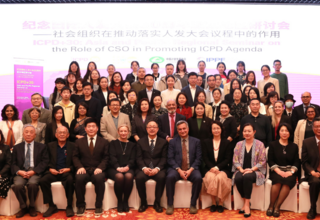Population size and structure impact a country’s economy as well as its ability to provide social protection and access to health care, education and other services. Government policies that promote development and reduce poverty are more likely to succeed if they take into account population dynamics.
According to results of the 2020 national census and other resources, China is and will continue to experience a combination of multiple, intertwined population and development issues, including sustained low fertility, rapid ageing and rapid urbanization. Commensurate policy responses that respect the principles agreed by all member states in the 1994 International Conference on Population and Development (ICPD) are urgently required.
In the ninth Country Programme between the Government of China and UNFPA (2021-2025), UNFPA contributes to strengthening the capacity of the Government of China to design and implement quality, gender-responsive and evidence-based policies and programmes to address China's demographic transition.
Addressing emerging population issues, with a focus on left-behind groups
UNFPA advocates for and supports the generation of reliable and accessible disaggregated population data in collaboration with the United Nations agencies, to address emerging issues around low fertility, migration, urbanization, multi-dimensional poverty and tracking of the Sustainable Development Goals (SDGs) progress. Data with a focus on left-behind groups helps fill the data gaps related to the prioritized UNFPA SDGs indicators, for an improved national SDGs monitoring and reporting for China.
Promoting adequate attention to the advancement of rights and choices for all
UNFPA supports state-of-the-art disaggregated analysis on the evolving demographic, social, economic and cultural environment. It contributes to the advancement of sexual and reproductive health and rights of individuals, gender equality and equitable access to social, health, and lifelong learning services.
Responding to low fertility and rapid ageing by employing a rights-based life-cycle approach
In partnership with Government bodies and research institutions and building on analysis of demographic evidence and existing national and international policy practices, UNFPA proposes quality gender-sensitive policies and programme options, to enable the Government to better employ a rights-based life-cycle approach in its response to low fertility and rapid ageing.
Building non-traditional partnerships in population data analysis and use
In partnership with both the national and local governments as well as the private sector, UNFPA explores innovative and mutually beneficial partnerships, particularly with local governments and the private sector, in addressing national challenges around ageing, population and development planning, and population data.




